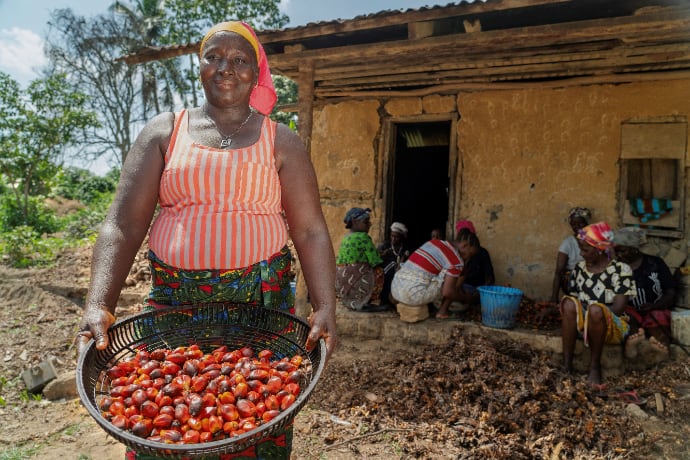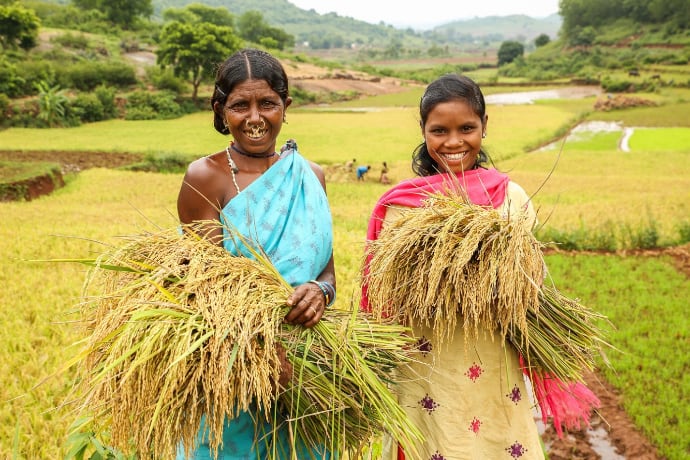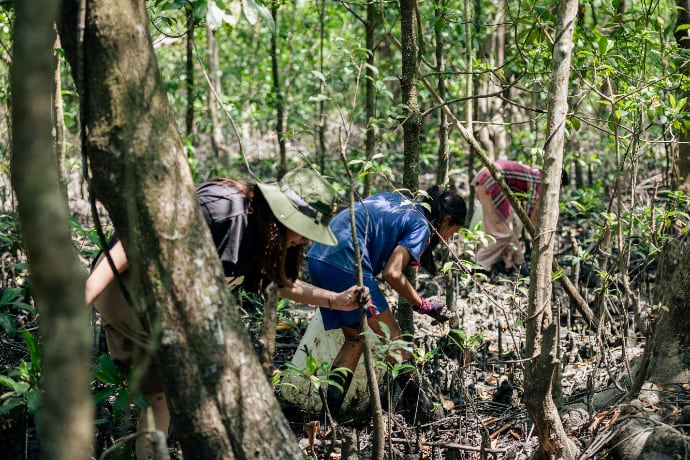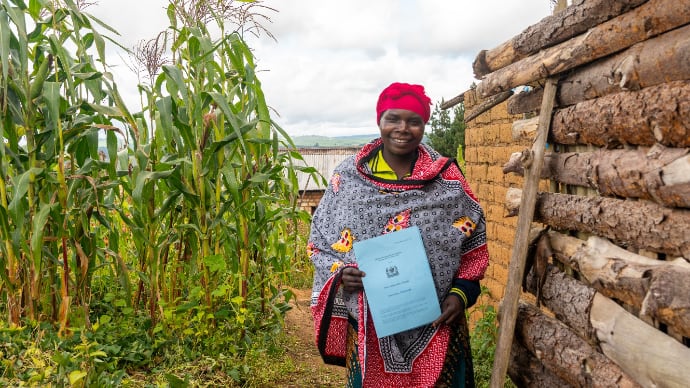By Joel Meyers

Secure land rights in Bong County, Liberia enable communities to grow food for sustenance and income. Photo: Landesa
Landesa advances pro-poor, gender-sensitive land rights reforms through law and policy tools. These reforms have helped alleviate poverty, reduce hunger, and ease conflict over land for more than 180 million families. Secure rights to land boost agricultural productivity, improve health, nutrition and school enrollment, and have placed billions of dollars in new land wealth in the hands of rural people.
We were able to connect with Dr. Jolyne Sanjak, Sr. Director of Global Programs at Landesa, to dive deeper into how their programs are advancing food security in the communities where they work.
Please introduce yourself and briefly describe your role at Landesa as Sr. Director of Global Programs.
My name is Dr. Jolyne Sanjak and I serve Landesa in the role of Sr. Director of Global Programs. Over my career, my work has centered on land rights following my belief that land rights are foundational to solving many global challenges, including food insecurity. I bring to Landesa my significant experience in economic development research and work on programs such as rural livelihoods, environmental sustainability, and gender and social integration, among others. Increasingly, Landesa and others are engaging with partners and approaches that sustain land rights by meeting the needs required for sustainable livelihoods, food security, and climate resilience. In my role, I support our four global teams: Landesa’s Center for Women’s Land Rights, Climate Change, Corporate Engagement, and Research, Evaluation & Learning.
Landesa’s mission is to secure land rights to break the cycle of poverty. Why is securing land rights so important for establishing food security in the Global South?
Food security has several dimensions including the supply or availability of food and access to food (economically and physically). In rural areas, most people experiencing poverty rely on their harvests to survive. Land degradation, droughts, and extreme weather patterns threaten these harvests and cause severe and often chronic food insecurity. Securing land rights for these farmers and other land stewards enables them to invest in their land for the long-term. Without the possibility they will lose their land in the future, a farmer has peace of mind to invest in sustainable practices like irrigation technologies, terracing, fallowing, and agroforestry and ultimately grow sufficient nutritious food for their families. This peace of mind and the incentive effects of secure land rights can also motivate investments that expand job opportunities off the farm and reduce the need for family members to stay on the farm to guard their rights, expanding economic access to food.
To establish food security, why is it important to establish land rights for women in particular, including inheritance rights for girls?
In sub-Saharan Africa and southern Asia, approximately two-thirds of women’s employment is in agrifood systems. However, women are less likely to own land and tend to farm on smaller parcels of lower quality. With secure land rights, women are better able to access resources like microcredit, agricultural subsidies, crop insurance, and agricultural extension, which can all contribute to increased agricultural productivity and food security. Women’s land rights have been linked to improved child nutrition as well.

A woman and her daughter in Odisha, India, were able to invest in their land after receiving formal title to a small plot of their own. Photo: Landesa
How has climate change affected your programs?
Climate change is degrading the lands more than 2.5 billion people rely on for their food and livelihoods. In 2020, Landesa committed to deepening its work on climate change; land rights offer a crucial foundation for communities to invest in climate-smart practices and benefit from restored ecosystems. Our Climate Change Program works at the global, regional, national, and community levels to influence systemic policy reforms that build climate resilience and to ensure the effective implementation of those reforms. We place a particular focus on women, Indigenous Peoples, and youth—groups that are both marginalized when it comes to land rights, and powerful agents in the fight against the climate crisis. The climate crisis has brought the need to secure these groups’ land rights into greater focus. This presents a new source of funding for local organizations, including direct funding to Indigenous Peoples’ organizations, as well as for organizations like Landesa, and expanded avenues for advocacy and partnerships from local to global levels.
Please describe how you are working with the private sector to establish partnerships, and why these are important…
Companies and investors are increasingly recognizing the importance of responsible land-based investments. Landesa works with companies to support responsible land-based investments, navigate land risks, build trusting relationships with affected communities, and meet global standards of responsible investment and value chain management. Strong land rights contribute to sustainable supply chains and foster more stable and productive conditions for business. Rural communities with access to strong land rights also benefit more from the economic opportunities created by these investments.
Landesa (formally Rural Development Institute) has been a formal organization since 1981. It is evident that you have achieved great success in your mission and have gathered a plethora of data to evaluate your methodologies for continuous improvement. What is your approach for securing land rights, and why is it important?
Landesa uses a systems change framework in our effort to secure land rights for women, men and their communities around the world. We operate at multiple levels of governance: we advocate for the inclusion of land rights in global agendas and sectoral norms, we work directly with national governments on law and policy reform, and we partner with civil society organizations from local to global levels to ensure policies become practice.

In coastal Cambodia, mangrove forests offer a source of food and livelihood. Photo: Landesa
Which countries or regions are seeing the highest need for securing land rights, and how is each region different and do you need to customize your approach to each?
Land rights challenges, especially for people experiencing poverty and marginalized groups, exist around the globe. Our country programs are in sub-Saharan Africa and Asia and our global programs support progress on land rights in other geographies such as Colombia and Brazil where there are particular opportunities for advancing women’s land rights and for our corporate engagement efforts. It is widely accepted in our community of practice that there is no recipe or silver bullet to assure access to and security of land rights. Even within a country, the types of rights; the nature of land governance including the overlay of state law with traditional, tribal, or customary law and related practices; and the historical, cultural, and social patterns that underlie these may vary significantly. Pathways toward inclusive and secure land rights need to be context-appropriate and Landesa country programs are led and staffed by local experts. Landesa’s work pairs locally-led solutions with its learning from global comparative experience.
What are the biggest challenges you are seeing – any recent trends or world events, for example – that are affecting food insecurity today that you can share?
Climate change is by and large the gravest challenge humanity faces. Rural communities, and marginalized groups within them, feel the effects of climate change—including worsening food insecurity—the most harshly. But we also know the people most impacted by climate change are also those already galvanizing solutions, which is why we champion women, Indigenous Peoples, and youth in our work. Conflicts such as the ongoing war in Ukraine also have had reverberating consequences on food security for countries in the Global South.

A woman in Mufindi, Tanzania holds her Certificate of Customary Rights of Occupancy documenting her right to land. Photo: Landesa
What advice can you share for small organizations who work in the Global South to help them achieve food security in the communities where they work?
Food security is a multifaceted issue. Securing local landholders and users rights to use, access, and control rights to their land—especially for Indigenous Peoples and rural communities who farm for subsistence or income—is critical. As you support programming to address food security, consider how land rights matter for meeting your objectives and find ways to support the people you work with or their governments to improve land rights, including through partnerships.
Can you share any personal stories or reflections from the field that give you hope
Despite much progress on land rights, some of the top-line country level statistics about just how many women, men, Indigenous Peoples, and local communities still face insecure land rights has not really changed much over my career—that can be saddening. However, today land rights are slowly and surely gaining traction with the increased urgency to resolve big global threats like climate change. And, Landesa and others are increasingly knitting together land rights work with efforts to address correlated needs that must come together for food security and climate resilience. These two trends are among the things that now give me hope that I might see real change toward tenure security for all.